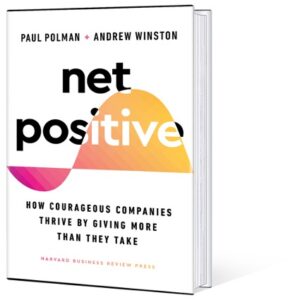[Mid-August was the 5-year anniversary of an important moment in sustainability, a public statement by the CEO group Business Roundtable about the importance of stakeholders. This is an article I wrote with my Net Positive co-author Paul Polman looking back and assessing where we are now vs. the hype. It first appeared in HBR]
On the surface, it was a big deal. The members of the Business Roundtable (BRT), 181 CEOs of the biggest companies in the U.S., issued a statement redefining the “purpose of a corporation.” After decades of obsession with short-term profits and investor returns, they committed to serving five stakeholders: customers, employees, suppliers, communities (including the environment), and shareholders.
Here were the titans of business saying, implicitly, that Milton Friedman was wrong. The statement was hailed as a shift towards stakeholder capitalism and a refocusing on the role of business in society.
The timing was, it turned out, good — the annus horribilis of 2020 was around the corner. The pandemic made companies focus on stakeholders, and the murder of George Floyd led to new commitments to racial equity.
The CEOs were also right. Serving only shareholders overlooks a fundamental reality: You have to please customers, attract and retain talent, and work with communities and suppliers to create valuable enterprises. Long-term resilience and business survival depend on sustainably serving stakeholders and society. Business cannot thrive on a damaged planet with unhealthy people.
While the self-selected BRT companies may have already leaned toward stakeholder thinking, their commitment mattered and drove progress. But more recently, especially in the U.S., enthusiasm for many stakeholders’ sustainability priorities — such as climate change or DEI (diversity, equity, and inclusion) — has seemingly stalled. It’s worth reflecting on what has happened since the statement, and where we’re going.
The Good News: Progress
Even with a reduced focus, sustainability is now firmly on the corporate agenda, and the work continues. Take decarbonization, for example. Since the BRT statement there’s been a surge in aggressive carbon-reduction goals, up from just a handful of organizations a decade ago, to two-thirds of Fortune Global 500 companies with significant commitments today.
The shifting economics in favor of sustainability make it difficult, and bad business, to go back. Global clean tech investments will surpass $2 trillion this year — double the total investment in fossil fuels — spanning transportation, energy, buildings, and more. The energy and auto industries are in the early throes of a great transition, in large part reacting to signals from the marketplace. The real issue is whether we’re moving at the speed and scale needed to outpace climate change and its significant human and financial costs. (Spoiler: We’re not.)
Some other progress: A significant expansion of diversity, equity, and inclusion (DEI) efforts and education (which are now facing a backlash), some increased focus on nature and biodiversity, and structural changes inside companies, such as a significant increase in the percentage of large companies tying executive pay to diversity or carbon reduction metrics. While a few sustainability issues, like human rights, never truly took off, there has been significant progress overall.
However, given the improving economics of clean technologies, increased legislation, and more pro-sustainability signals from the marketplace and society, how much credit should BRT companies really get? Again, stakeholder capitalism makes business sense.
The Not So Good News
On climate, companies are lagging behind the 2015 Paris agreement goals to hold global temperature rise to below 2°C (and preferably limit it to 1.5 °C). Many companies are now falling behind even their own targets. And far too few have a good handle on how their businesses impact and depend on biodiversity and natural resources, such as how water shortages might disrupt operations and supply chains for food or consumer products companies. In short, the overall progress is underwhelming and slow compared to what the world needs.
Unfortunately, two trends that are a sign of progress — the increase in regulations on materiality and reporting and the rise of ESG (environmental, social, and governance) investing in the finance world — have contributed to the recent pullback. The regulations have driven some companies back to a “just comply with the law” mindset (which slows their ambition). And while investors coming the table was a good thing, it has amped up attention on their needs over those of other stakeholders.
And then came the backlash and growth of the anti-ESG movement, a heady mix of competing pressures on companies to do more legitimate sustainability work and avoid using ESG to greenwash or abandon ESG because of its perceived liberal roots and supposed distraction from financial returns (this one coming mainly from the political right). In this new environment many companies seem to believe that they just need to meet reporting requirements and don’t have to pursue more aggressive sustainability goals anymore. For example, mining giant Glencore was going to sell coal assets but, citing a “pendulum shift” on ESG, is now doubling down on old tech.
Across sectors, corporate commitments have faltered, especially around DEI. Some former leaders, like Nike, have laid off sustainability people. A few companies, like Tractor Supply Company and John Deere, have even issued anti-sustainability statements — no more DEI, no more carbon goals they say. Very few companies have been this aggressive about it. In our work and conversations with many dozens of multinationals, we see an overwhelming majority choosing instead to stay quiet about their sustainability efforts (called “greenhushing”).
There’s been little corporate pushback on politically motivated attacks on ESG and DEI. In fact, companies (including BRT members) are continuing to donate to politicians deeply involved in the anti-ESG attacks and even those who actively supported the overturning of the free and fair U.S. election in 2020. Some powerful trade associations continue to attack climate policies and disclosure regulations. CEO salaries continue to sharply outpace wages. Executives, investors, and the media continue to celebrate stock performance — a crude measure of success for a single stakeholder — as a company’s main measure of success.
Perhaps the recent pullback isn’t too surprising. Looking back, there were important cracks in the BRT’s logic. The statement’s clear commitment to free markets ignores the fundamental flaws in the system — perfectly free markets do not address externalities (like dumping carbon pollution in the sky) or optimize for stakeholder well-being. True stakeholder capitalism requires a deeper change in thinking, moving from seeing sustainability as something at odds with profits — the longest-standing myth — to a more nuanced view of creating value through values and sustainability.
The last five years clearly have proven to be a mixed bag. While the companies we know are continuing their sustainability work, the urgency, speed, and scale of change is severely lagging. Most companies seem to be fine keeping their heads low, and the desire to lead publicly has nearly disappeared in the U.S.
This is a colossal mistake. To say that this is a bad time to slow down is a profound, historic understatement. The world’s biggest challenges — climate change, inequality, biodiversity destruction — are getting worse. The planet set a record for hottest day ever recorded … and broke it the next day. Unprecedented wildfires, severe droughts, dangerous heat, and climate-juiced storms are now the norm. For years, scientists at the Stockholm Resilience Centre have defined and measured nine “planetary boundaries” that, if we breach them, create serious risk for humanity — measures such as how much carbon we put in the atmosphere, the rates of species loss or ocean acidification, and the use of freshwater. By their best measurements, we have exceeded six of the nine boundaries, and we’re risking negative tipping points. All of these dangerous trends raise costs for business as, for example, extreme weather or water shortages disrupt supply chains or production.
Making things worse, democracy is at risk and the political environment is toxic, with riots across the UK, assassination attempts of political leaders around the world, continuing war in Ukraine and the Mideast, and rising attacks on democracy, people’s rights, and decency. The very problems that sustainability helps to address, especially inequality, create fertile ground for angry populism that undermines progress.
At this extremely volatile time, companies have more power than ever, with influence in every corner of the world. For leaders to go quiet now, while social and planetary systems are breaking down, is breathtaking.
What Leadership Really Looks Like
Five years ago, we all celebrated the BRT statement, but even then, it lagged behind what’s needed. It was an improvement, but mostly incremental in nature, an underwhelming response to the exponential challenges that require more systemic changes beyond merely recognizing stakeholders. Given the stress on our largest natural and societal systems, we need accelerated action — deeper work to build better, more regenerative businesses. We need to build net positive companies, that is, businesses that take responsibility for their impacts on the world and improve the well-being of everyone they touch.
True leaders thrive and profit by helping to solve the world’s problems. They act in line with what science and decency demand, and they work on systemic issues, including the right policies. They call for more ambitious climate commitments, defend the principles of ESG, build public-private collaborations to restore biodiversity, and protect human rights. Most importantly now, they speak out to defend democracy and protect those with the least.
And yet, with few exceptions, there has been silence on most of these issues. In a poisoned political environment, most companies have chosen the path of — what they think — is least resistance (seemingly whatever will lower taxes and keep them from being a target). We have fewer leaders, and more managers.
The bottom line is that in celebrating BRT companies for being incrementally better than others, we were self-congratulatory and missed the point. The focus should be on whether companies are moving fast enough — for science and society — towards a net positive, restorative, and regenerative business model.
And that requires, if nothing else, courage — the fortitude to step up to what the science and the times require.
A Call for Courage
When things go off track, it’s helpful to return to basics. Companies should review the broad business case for sustainable action. Building net positive businesses is the best path to long-term value, resilience, and relevance. At the macro level, as we face systems collapse, it’s the only path. The cost of doing nothing greatly outstrips the cost of doing something.
Companies should bring back the voice of stakeholders — listen to employees, ESG investors, civil society, customers, consumers, and more — and truly assess the costs of staying silent in the face of attacks on human rights and freedom. There’s far too much focus on the risk of doing something instead of thinking about what it says to stakeholders if you do nothing.
Following the herd — at first, publicly committing to purpose and stakeholders, and now, succumbing to backlash and greenhushing — is, at best, complicity with whatever happens. What it’s clearly not is courageous. Continuing in silence, and going wherever the political wind is blowing, is bad for business, society, and your soul. We’re in a crucial period for humanity and it takes more than a few bold leaders; it takes courageous action from all.
The current state of affairs is not just disappointing, it’s alarming. The time for half-measures and incremental progress is over. We need more than just statements. We need bold, decisive leadership and action to ensure a sustainable and equitable future for all.
(Image: Istock, mbbirdy)
- If you enjoyed this post, please pass it on. Subscribe to get all of Andrew’s articles in your in-box.
- Follow Andrew on LinkedIn (I’ve exited Facebook and paused Twitter for now)
- Join the Net Positive movement or to expand your learning, check out our new Net Positive online classes and other executive education offerings.



